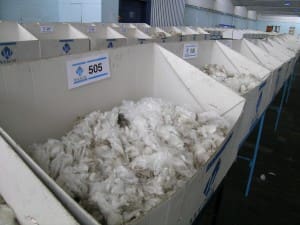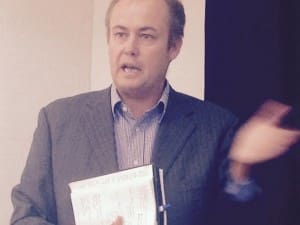 AN ONLINE wool exchange portal proposed by the Wool Selling Systems Review Panel is not intended to lead to establishment of a single desk trading structure, the panel’s executive officer John Roberts said.
AN ONLINE wool exchange portal proposed by the Wool Selling Systems Review Panel is not intended to lead to establishment of a single desk trading structure, the panel’s executive officer John Roberts said.
In its recently-released discussion paper, the WSSR panel has proposed the development of a Wool Exchange Portal that would not replace existing selling options, but be an online meeting point where woolgrowers and buyers could detail wool on offer or sought.
The panel discussion paper has said the portal would not replace any of the existing selling channels or alternatives, but work with them.
The operators of Australia’s current online wool trading business, AuctionsPlus Wool and Wooltrade, have declined to comment on the suggestion and Mr Roberts said the WSSR panel had not discussed the Wool Exchange Portal concept with the businesses, or any other industry body.
“But they (AuctionsPlus) would be a logical group to talk to if the WEP was progressed,” he said.
Portal could cater for new wool marketing options
Mr Roberts said the WEP would be a connectivity platform to tap into existing stakeholders “and also cater for new ones”, but would stop at the point of transaction.
“At this stage, we are trying to provide a connectivity platform which provides sellers and buyers with the best outcomes.
“This is not just about cost savings it is about whether better prices can be achieved through the connectivity.”
Mr Roberts said it would good for the wool industry to take some ownership of the WEP, if they wanted to, and that could be through AWI or AWEX, a combination of those groups or others.
But the WSSR panel was not suggesting that woolgrowers should own or create a new body or company that would sell or trade wool.
“We don’t want to go anywhere near a single desk kind of structure – I could speak on behalf of the panel in saying that.”
The panel was not suggesting that any part of the wool industry should be regulated or mandated, but that it consider options for improving transparency and cost savings.
“It also about making sure the wool industry does not get left behind in the dark ages – technology has come a long way in the last 15 years since we last looked at sale by description.
“You want to make sure that there is a platform available that allows it to embrace any technologies.”
The discussion paper said the proposed WEP would also include:
– An extensive information database of selling options available to woolgrowers;
- A ready-reckoner to assist woolgrowers to assess the financial outcomes of selling alternatives including the current dominant ‘open cry’ avenue;
– A ‘smart router’ that would promote the best outcomes for woolgrowers based on pre-set selling parameters;
- Delivery of different testing and appraisal options, and;
– A ‘find a broker’ and ‘find an exporter’ function.
Stakeholders to attend invitation-only workshop on July 21
The WEP will be discussed at an invitation-only workshop in Melbourne on July 21 for key stakeholders who consulted with the WSSR panel or who made the 68 submissions to the review issues paper released late last year. A media briefing will be held after the workshop.
Mr Roberts said the WEP might also be of benefit to buyers and exporters to put in physical forward orders.
“It will be interesting to see what the reaction is at the workshop.”
Mr Roberts said the WEP concept “can’t hurt” competitive tension between difference selling options, though the panel has recognised that competitiveness between brokers and in the auction system was “reasonable”.
“But I think providing more access and greater clarity, and putting more options front and centre you would think would create more competitive tension.”
He said the WEP’s ready reckoner could potentially highlight the really competitive brokers.
Level of industry participation would determine portal’s success
Mr Roberts agreed the level of industry participation would determine the success of the WEP.
“If the industry want it I don’t there are a lot of obstacles, but that is not something the panel has really looked at closely at this stage.
“We are really trying to see if the industry sees benefit in it conceptually,” he said.
“If they do and if woolgrowers want it, and therefore they will use it; they will either want to try to take wool to it directly or put it through a broker, then it will happen.
“But if they don’t, and they don’t see any benefit in it, then we have highlighted a number of issues where we think there could be some improvements.”
Mr Roberts said the issue of standardisation of wool charge information, including post-sale charges, to improve transparency via the portal needed to be discussed at the workshop.
“We really want people to have some input on that.
“To be able to make clear comparisons would be, I think, a key offering of it (the WEP).”
Mr Roberts said the WSSR panel had discussed WEP funding, but believed it was “inappropriate to draw any conclusions until we hear what the industry has to say.”
Give wool portal idea “a go” says former Wooltrade manager
Former Wooltrade market operations manager Tony Benson said he hoped the wool industry gave the WEP concept “a go.”
“AWI has a real opportunity to make positive change in the wool industry by building a wool portal and woolgrowers should embrace this new service.”
But he said “a lot of ducks need to be shot to make this possible and I don’t think what is proposed is cutting edge in 2015. For example, is Facebook or commsec called a portal?”
Mr Benson said the WSSR discussion paper “reads as a dated document in 2015.”
“But that is an easy fix because of the amazing young IT talent already in agriculture eager to make change – just look at Twitter for inspiration.”
Some questions were not answered in the discussion paper, he said.
“How does the consumer get involved in this website and how are we marketing the world’s best wool any better than today’s methods?
“Wool need a change and this is the best thing I have seen in years, I hope the industry gives it a go.”
The WSSR panel also believed there are no institutional obstacles to:
– deeper investigation of the centralisation of selling centres;
– the development of on-farm wool testing options, and;
– greater transparency of broker charges and a further investigation of commission buying and its effect on sale room competition.
Click here to read the Discussion Paper
Any comments or submissions on the discussion paper can be emailed to [email protected] Final submissions to the review are due September 4, 2015.



HAVE YOUR SAY